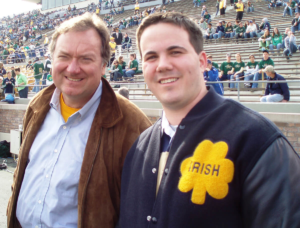What weapons do we have for fighting for the truth? It’s easy to agree with one British philosopher about the urgency of taking on this task (listen). But in a time of post-truth and untruthtelling, it has turned out to be a surprisingly difficult, uphill battle.
In considering this issue, we will encounter an age-old paradox. To defend the Truth, someone must play the role of the defender. But who is to say that a particular individual, corporate entity, or political regime is equipped to act as the arbiter of Truth? Indeed, what is to prevent them from putting their own interests above the Truthseeking principles they claim to defend.
18. Monday, April 3: Great Journalists as Protectors of Democracy
CLASS VISIT
We will have a class visit (by Zoom) with Robert (Bob) Costa (’08), chief election and campaign correspondent for CBS News
“On Reporting and Politics — Bob Costa” READ, PRINT, LISTEN
For background on Bob’s visit, please read the following interview with Tim Russert was one of America’s greatest reporters and political interviewers. This interview will give you a good idea of his approach to truth-seeking: READ AND TAKE NOTES
Russert’s last public address was at Notre Dame. See his Notre Dame 2002 commencement speech HERE
19. Wednesday, April 5: Tools and techniques for distinguishing fact from fiction, lies, disinformation, and bizarro conspiracy theories.
Today, I would like to address the possibility of identifying effective tools for fact-checking in an era of Post-Truth and conspiracy theories.
Assignment: In preparation for this class, I will divide our class into smaller groups ad ask each group to identify two specific and workable tools for combatting lies and disinformation on social media. Each group will have tested these tools beforehand.
Examples of Tools for Combating Disinformation:
Darrell M. West, “How to Combat Fake News and Disinformation.” Brookings, 18 Dec. 2017 READ A good general article about the need for combatting disinformation and the prospects and perils of doing so.
Checkpoint: A tool for identifying malicious Covid-related websites HERE
The new Twitter comes up with a new approach, Community Notes: HERE
See what Elon Musk has to say about Community Notes HERE. It’s also interesting to see whose tweets he is sharing.
As you identify these and other tools, ask whether or how each could inadvertently and paradoxically end up promoting Untuth.
Another tool is persuasion. What does one need to do to persuade someone to change their mind? A good example here is the refusal of many people to get vaccines to combat Covid.
Adam Grant, “The Science of Dealing with Unreasonable People” PRINT AND READ
And then for a dose of reality, read this scholarly study and ask yourself whether we have a realistic chance of successfully combatting real the appeal of “fake news”:
Oscar Barrera, Sergei Guriev, Emeric Henry, and Ekaterina Zhuravskaya, “Facts, alternative facts, and fact checking in times of post-truthpolitics”: READ TO GET A GENERAL SENSE FOR THE ARGUMENT AND TAKE NOTES
EASTER BREAK: Friday, April 7 – Monday, April 10
20. Wednesday, April 12: John Dewey Revisited. Public Engagement as a solution
In this session, we will have four group presentations about the Wikipedia sites you have been following and editing.
HERE is your second essay question
Due Date: Next Friday, by 12:00pm
21. Monday, April 17: Should we allow others to do the work of safeguarding Truth for us? Or are we fooling ourselves in thinking we have a choice over the matter?
What role should the leaders of global communications networks play in defending the Truth? Should they have a say? Or do we even have a choice in this matter? In this section, we will reflect on both the policies of digital giants and their negative and/or positive political and social implications. There are a lot of readings, but they are short.
Consider the continuing controversies over Twitter: Have these individuals already supplanted the traditional roles of politicians? Are they the new dictators and Masters of the Universe?
Richard Nieva, CNET, 2019: “Mark Zuckerberg, Jack Dorsey, and the Fight for Social Media’s Soul”: PRINT AND READ
Elon Musk Reverses Trump’s ban on Twitter (while seeking to reassure his users and sources of revenue): HERE
Dorsey makes matters confusing, going from consistently defending the ban of Trump and then calling the decision into question (kind of) :
First: Defend the Ban: HERE
Second: Lift the ban (note how he explains why it was a mistake): HERE
Once you have read these articles, do a Google search or a Twitter-search to see what Musk has been up to.
One result: Clare Duffey, “NPR and PBS stop using Twitter after receiving ‘government funded media’ label” READ (Also, note the reference to Russian state media)
Now, to put the power of corporate giants, let’s insert ourselves into the picture:
Check out your Google Account and see what information Google has already collected on you—some of it is probably correct, some of it incorrect. Both possibilities could be a problem. To find your account, go to your profile picture and follow the link to “Manage your Google Account.”
Caitlin Dewey, Washington Post, August 19, 2016, “98 personal data points that Facebook uses to target ads to you” READ
If politics is about power, this targeting is a scary of power! Is the trade off between the benefits of Facebook and the release of your private data? Could these data points be 98 good reasons for shutting down your Facebook account?
To see how bad things might be, read the summary of this journal abstract confirming that computers can know you better than anyone else HERE
Why do we humans continue to use technology if all of the evidence suggests that it is going to create immense problems for us down the road?
22. Wednesday, April 19. Second great debate!
TBA
